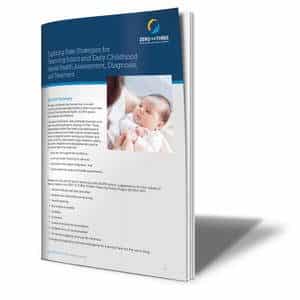This article summarizes key themes from Maryland’s role in a convening of states and jurisdictions centered around improving state policies supporting Infant and Early Childhood Mental Health assessment, diagnosis, and treatment.
 Children’s earliest experiences impact their brain formation and in turn, their social and emotional, physical, cognitive, communication, and sensory and motor skills development. Recognizing the tremendous opportunities and risks associated with this critical time, states are increasingly investing in promoting infant and early childhood mental health (IECMH), defined as the capacity of a child from birth to age five to experience, express and regulate emotions; form close, secure interpersonal relationships; and explore his/her environment and learn, all within the context of family and cultural expectations. ZERO TO THREE released two papers in 2018 and 2019 highlighting strategies states are employing to support children’s IECMH. Highlights from Maryland include:
Children’s earliest experiences impact their brain formation and in turn, their social and emotional, physical, cognitive, communication, and sensory and motor skills development. Recognizing the tremendous opportunities and risks associated with this critical time, states are increasingly investing in promoting infant and early childhood mental health (IECMH), defined as the capacity of a child from birth to age five to experience, express and regulate emotions; form close, secure interpersonal relationships; and explore his/her environment and learn, all within the context of family and cultural expectations. ZERO TO THREE released two papers in 2018 and 2019 highlighting strategies states are employing to support children’s IECMH. Highlights from Maryland include:
- In a section focused on increasing the number of IECMH providers with the support of IECMH associations and credentials, Maryland’s work is described. Maryland is launching the ninth cohort of their state infant mental health certification program.
- In a section focused on supporting cross-agency work, Maryland’s Project LAUNCH work is highlighted. Through that project, Maryland developed IECMH core competencies for home visitors and collaborated with home visiting programs to design and deliver an IECMH home visiting curriculum.
Learn more about how Maryland and other states are promoting IECMH in Advancing Infant and Early Childhood Mental Health: The Integration of DC:0–5™ Into State Policy and Systems and Exploring State Strategies for Financing Infant and Early Childhood Mental Health Assessment, Diagnosis, and Treatment.
Maryland is one of twenty states and jurisdictions participating in ZERO TO THREE’s IECMH Financing Policy Project that supports states in improving IECMH policy and practice, with a focus on financing.




